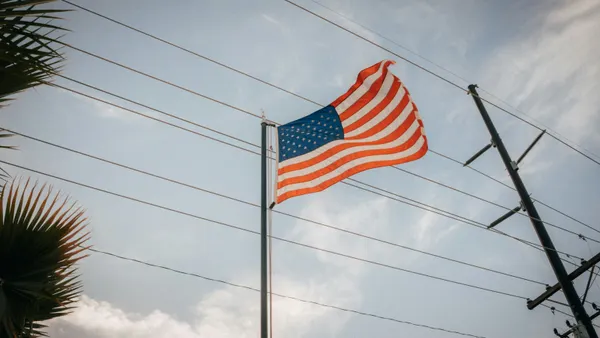Dive Brief
- The Arizona Senate passed House Bill 2101 on Tuesday, advancing legislation to the governor's desk intended to address reliability issues and prevent blackouts similar to recent disruptions in Texas and California.
- Opponents of the bill, from clean energy advocates to generation companies, argue the legislation would change an older statute that allowed retail competition in the state. NRG-subsidiary Green Mountain Energy applied with state regulators last summer to offer customers clean energy within the territory of Arizona Public Service and Tucson Electric Power.
- "This measure won't do anything to help households keep the air conditioning flowing during a heat wave or keep the lights on during a storm or fire," Shelby Stults, Arizona policy lead at Advanced Energy Economy, said in a statement. "It's unfortunate to see the legislature fall for such a self-serving ploy from the state's monopoly utilities."
Dive Insight
In hailing H.B. 2101, Republican state legislators rallied behind a need for energy reliability in the state. The Arizona Senate voted on the bill 17-11 largely along the party line with two Democratic senators abstaining from the vote and both the minority and majority leadership supporting the bill. Of those opposing the bill, many echoed concerns that utilities were guiding these efforts to preserve their legal monopolies over their service territories.
Reliability "is a frustrating topic because it's been cynically deployed by utilities in context of this legislation," Travis Kavulla, vice president of regulatory affairs at NRG Energy, said.
"If the goal is to improve reliability, avoid blackouts, and protect residents, Arizona should be looking for ways to curb demand at critical times and offer a diversity of innovative, advanced energy technologies to customers," Stults said.
State legislators had been asking through past hearings on the bill about ways to avoid the recent blackouts on the Texas and California grid, following lobbying from a coalition that included utilities. Several advocates that opposed the bill have called it an SRP-led effort, although the public utility maintains it was part of a broader coalition supporting the bill.
"SRP is one member of a very broad coalition that includes consumer advocates, chambers of commerce, labor organizations ... and others who lobbied in support of this bill, which supports grid reliability and consumer protections," Garcia-Likens said.
SRP and other utilities could potentially lose customers that opt for other service providers if retail competition is established within the state.
"This coalition has strong concerns about the prospects of deregulating Arizona's highly performing electrical system, particularly after seeing two decades of experiences in other states - often higher costs, diminished reliability and the proliferation of predatory marketing -- to the detriment of customers. ... One only needs to look to California and Texas to see why Arizona's current utility system is such a better foundation for economic development," Patty Garcia-Likens, SRP spokesperson, said in an email.
However, several bill opponents said the reliability argument often created false equivalencies between Arizona and grid operators in those Southwest states. For example, while the blackouts of Winter Storm Uri were evaluated as a concern for high energy costs in Texas, Arizona legislators did not address unique factors in that market, such as the grid operator's pricing mechanisms, or the need for weatherization initiatives of gas infrastructure that the 2021 blackouts spurred.
"Allowing consumers to choose is not what causes reliability problems in electric markets," Kavulla said. Last winter, he added, "the data show there was a higher rate of forced outages in those [vertically-integrated] monopolies than in those retail choice areas" of Texas.
Although the petition from Green Mountain Energy did not regard SRP territory, a recent Arizona Supreme Court ruling prompted state regulators to address and enforce non-ratemaking statutes, such as allowing retail competition in the state. According to AEE, there had been a handful of applications similar to Green Mountain Energy's in the last five years.
If Gov. Doug Ducey, R, signs the bill or fails to veto it by Monday, the legal pathway for retail choice in the state would be changed, according to advocates.
The Arizona Corporation Commission could provide retailers entry into the state by adopting separate rules on competition, but experts say the current bill sends negative market signals to companies considering the state.
"Simply put, it is not reasonable for Green Mountain [Energy] to invest in a business model exclusively built around a majority vote of the Arizona's elected utility regulator, without a statutory pathway to licensing, but that is what HB 2101 would in essence require us to bet on," Mark Parsons,vice president and general manager of the company, said in a statement.
Distributed solar and public utilities
In February, distributed solar in Arizona had a success when the 9th Court of Appeals ruled on an antitrust litigation suit against SRP by a number of the utility's customers.
"SRP does have the worst rooftop solar rates for its customers in Arizona ... but this case is important for broader reasons," Autumn Johnson, executive director of the Arizona Solar Energy Industries Association, said. "It basically says utilities, not [just] investor-owned utilities are liable, but every public power utility that has discriminatory rates, all of that is potentially up for grabs to be challenged."
That ruling, according to Johnson, was largely based on the laws that would be changed by H.B. 2101. According to her, the statute in question had been discussed in litigation with SRP since 2019.
Asked by legislators to address this directly in the hearings, SRP representatives said the bill, which was crafted in the fall, did not have intended impacts on the suit, which was remanded to the district court to continue antitrust litigation.














